Films from the country "german", sorted by rating

Une histoire d'amour (1954)
Directed by Rudolf Jugert
Origin German
Genres Drama, Romance
Actors Hildegard Knef, O.W. Fischer, Viktor de Kowa, Mathias Wieman, Karl Ludwig Diehl

Love '47 (1949)
, 1h58Directed by Wolfgang Liebeneiner
Origin German
Genres Drama, Romance
Themes Political films, Films based on plays
Actors Hilde Krahl, Karl John, Hedwig Wangel, Albert Florath, Grethe Weiser, Erich Ponto
De retour en Allemagne, Beckmann découvre que, pendant qu'il était prisonnier en Sibérie, sa femme est avec un autre homme et son fils est mort. Il cherche désespérément un seul moyen de s'en sortir, parce qu'il "n'en peut plus". Alors qu'il marche le long de l'Elbe, il rencontre Anna Gehrke, qui "n'en veut plus". Tous deux racontent leurs vies.

Zehn kleine Negerlein (1969)
, 1h50Directed by Hans Quest
Origin German
Genres Crime
Actors Werner Peters, Peter Fricke, Alexander Kerst, Edith Volkmann
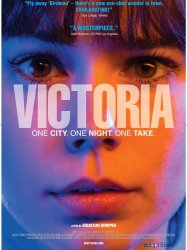
Victoria (2015)
, 2h18Directed by Sebastian Schipper
Origin German
Genres Drama, Thriller, Crime, Romance
Actors Frederick Lau, Laia Costa, Franz Rogowski, Burak Yiğit, Maximilian Mauff, André Hennicke
Victoria is a Spanish girl who moved to Berlin three months ago, works in a cafe for a meager wage, does not speak German and does not know anybody in the new city. Leaving a club at around 4 o'clock in the morning after a night of dancing and drinking, she meets four young men who are denied entry to the club. They are "Sonne" (sun), "Boxer", "Blinker" (turn signal), and "Fuss" (foot). The men invite her to take a walk through the city and she agrees. After stealing some alcohol from an all night shop, they all get on the roof of an apartment building where they drink and smoke marijuana together, while Boxer reveals that he spent time in jail for hurting someone.

Buena Vista Social Club (1999)
, 1h45Directed by Wim Wenders
Origin German
Genres Documentary, Musical
Themes Seafaring films, Films about music and musicians, Transport films, Documentary films about music and musicians, Documentaire sur une personnalité, Musiques du monde, Musical films
Actors Ry Cooder
The film documents how Ry Cooder, long-time friend of Wenders, brought together the ensemble of legendary Cuban musicians to record an album (also called Buena Vista Social Club) and to perform two times with a full line-up: in April 1998 in Amsterdam (two nights) and the 1st of July 1998 in the United States (at the Carnegie Hall, New York City). Although they are geographically close, travel between Cuba and the United States is restricted due to the political tension between the two countries, so many of the artists were travelling there for the first time. The film shows their reactions to this experience, as well as including footage of the resultant sell-out concert. It also includes interviews with each of the main performers.

The Wave (2008)
, 1h48Directed by Dennis Gansel
Origin German
Genres Drama, Thriller
Themes Films about education, Psychologie
Actors Jürgen Vogel, Frederick Lau, Max Riemelt, Jennifer Ulrich, Christiane Paul, Elyas M'Barek
High school teacher Rainer Wenger is forced to teach a class on autocracy, despite being an anarchist. When his students, third generation after the Second World War, do not believe that a dictatorship could be established in modern Germany, he starts an experiment to demonstrate how easily the masses can be manipulated. He begins by demanding that all students address him as "Herr Wenger", as opposed to Rainer, and places students with poor grades beside students with good grades—purportedly so they can learn from one another and become better as a whole. When speaking, they must stand and give short, direct answers. Wenger shows his students the effect of marching together in the same rhythm, motivating them by suggesting that they could really annoy the anarchy class, which is below them. Wenger suggests a uniform, to remove class distinction and further unite the group. Mona argues it will remove individuality, as well. Karo shows up to class without the uniform and is ostracised. The students decide they need a name, deciding on "Die Welle" (The Wave). Karo suggests another name, which ends up with one single vote cast by herself.

In July (2000)
, 1h35Directed by Fatih Akın
Origin German
Genres Drama, Comedy, Adventure, Romance
Themes Transport films, Films about automobiles, Road movies
Actors Moritz Bleibtreu, Branka Katić, Christiane Paul, Birol Ünel, Mehmet Kurtuluş, Fatih Akın
At the beginning of his summer holiday, a somewhat naive trainee teacher Daniel (Moritz Bleibtreu) buys a ring from a stall run by a neighbor, the aspiring artist and street vendor Juli (in German, "Juli" would be not only the month July but also a common nickname for someone named "Julia"; Christiane Paul). The ring bears a Mayan sun symbol, which, according to Juli, has the power to lead him to the woman of his dreams, whom he will recognise by a similar sun symbol. As Juli has the ring's counterpart, and as she is in love with him, she invites Daniel to a party that evening, hoping that they will meet.
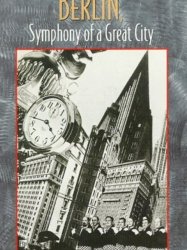 , 1h5
, 1h5Directed by Walter Ruttmann
Origin German
Genres Documentary, Historical, Animation
Themes Documentary films about cities
Berlin: Symphony of a Metropolis is largely an avant-garde film, and does not have a story or a plot. However, the events of the film are arranged to simulate the passage of a single day (simulated from an assemblage of film shot over the period of one year). Shots and scenes are cut together based on relationships of image, motion, point of view, and thematic content. At times, a sort of non-narrative commentary can be implied, as in edits that juxtapose workers entering a factory with cattle being beaten and driven into a corral.

Pina (2011)
, 1h46Directed by Wim Wenders
Origin German
Genres Documentary, Musical
Themes Dance films, Films about music and musicians, Documentary films about music and musicians, Documentaire sur une personnalité, Musical films
The film presents extracts from some of the most noted dance pieces by Pina Bausch in the Tanztheater ("dance theater") style of which Bausch was a leading exponent. The extracts are from four pieces: Le sacre du printemps (The Rite of Spring), Café Müller, Kontakthof, and Vollmond. These are complemented with interviews and further dance choreographies, which were shot in and around Wuppertal, Germany; the film includes scenes showing the Wuppertal Schwebebahn, an elevated railway, and some dance sequences take place inside its carriages.

The Trial (1962)
, 2hDirected by Orson Welles
Origin German
Genres Drama, Crime
Themes Political films, Dystopian films
Actors Anthony Perkins, Orson Welles, Jeanne Moreau, Romy Schneider, Akim Tamiroff, Elsa Martinelli
Josef K. (Anthony Perkins) is sleeping in his bedroom, in an apartment he shares with other lodgers. He is awakened when a man in a suit opens his bedroom door. Josef assumes the glib man is a policeman, but the intruder does not identify himself and ignores Josef's demand to produce police ID. Several detectives enter and tell Josef he is under open arrest. In another room Josef K. sees three co-workers from his place of employment; they are there to provide evidence regarding some unstated crime. The police refuse to inform Josef K. of his misdeeds, or if he is even being charged with a crime, and they do not take him into custody.
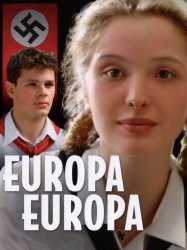
Europa Europa (1990)
, 1h52Directed by Agnieszka Holland
Origin German
Genres Drama, War, Historical
Themes Politique, Films about religion, Films about sexuality, LGBT-related films, Political films, Films about Jews and Judaism, LGBT-related films, LGBT-related film
Actors Marco Hofschneider, Julie Delpy, André Wilms, Artur Barciś, Michèle Gleizer, Nathalie Schmidt
Solek (a nickname for Solomon, also called "Solly") and his family live in Nazi Germany. On the eve of Solek's bar mitzvah, Kristallnacht occurs. He escapes, naked, then hiding in a barrel. At night, he calls his acquaintance to bring him clothes from his house. She refuses, but throws him a leather jacket with a swastika band on its arm. He comes back home. His family is together at home, but his sister is killed by Nazis. The father, who was born in Łódź, Poland, decides to go back there.
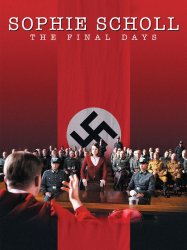 , 1h56
, 1h56Directed by Marc Rothemund
Origin German
Genres Drama, Biography, Historical
Themes Political films, Films about capital punishment
Actors Julia Jentsch, Fabian Hinrichs, Alexander Held, André Hennicke, Johanna Gastdorf, Maximilian Brückner
In wartime Munich, Sophie Scholl joins members of the White Rose student organization, including Sophie's brother Hans, who are preparing copies of their sixth leaflet. They have mimeographed more than they can distribute through the mail. Hans proposes distributing the extras at university the next day; despite Willi arguing that the risks are unacceptable, Hans says that he will take full responsibility, and Sophie volunteers to assist.
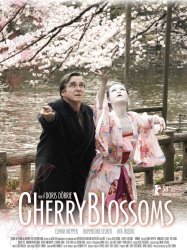
Cherry Blossoms (2008)
, 2h7Directed by Doris Dörrie
Origin German
Genres Drama, Romance
Themes Seafaring films, Transport films
Actors Hannelore Elsner, Elmar Wepper, Maximilian Brückner, Nadja Uhl, Birgit Minichmayr
The story culminates in a pilgrimage to Mount Fuji in the midst of the cherry blossom season, a celebration of beauty, impermanence, and new beginnings.

Destiny (1921)
, 1h40Directed by Fritz Lang
Origin German
Genres Drama, Thriller, Fantasy, Romance
Themes Time travel films
Actors Lil Dagover, Walter Janssen, Bernhard Goetzke, Rudolf Klein-Rogge, Eduard von Winterstein, Max Adalbert
In the Expressionistic frame story, in which human lives are each represented by a candle, Death grants a woman three chances to save her lover, if love can triumph over death. The three stories within the story each occur in a setting that is nominally historic, but really in the realm of fantasy: an adventure tale with a Persian setting out of the Arabian Nights, a Renaissance Venetian romance, and a largely comic story set in China.

Veronika Voss (1982)
, 1h44Directed by Rainer Werner Fassbinder
Origin German
Genres Drama, Crime
Themes Medical-themed films, Films about drugs, Films about sexuality, Films about psychiatry
Actors Rosel Zech, Hilmar Thate, Annemarie Düringer, Doris Schade, Erik Schumann, Günther Kaufmann
The film is loosely based on the career of actress Sybille Schmitz and is influenced by Billy Wilder’s Sunset Boulevard.
 Connection
Connection